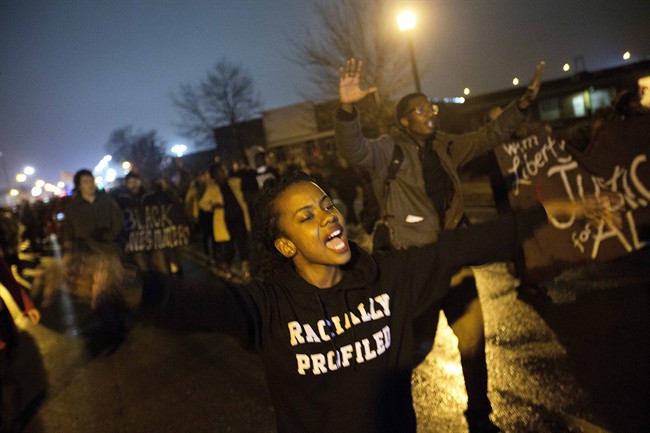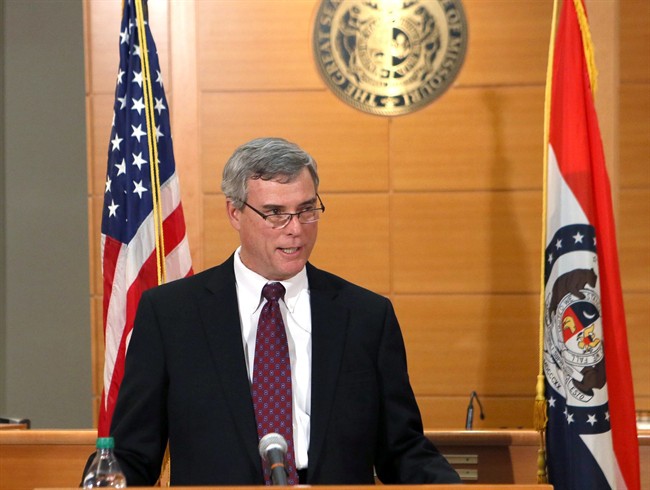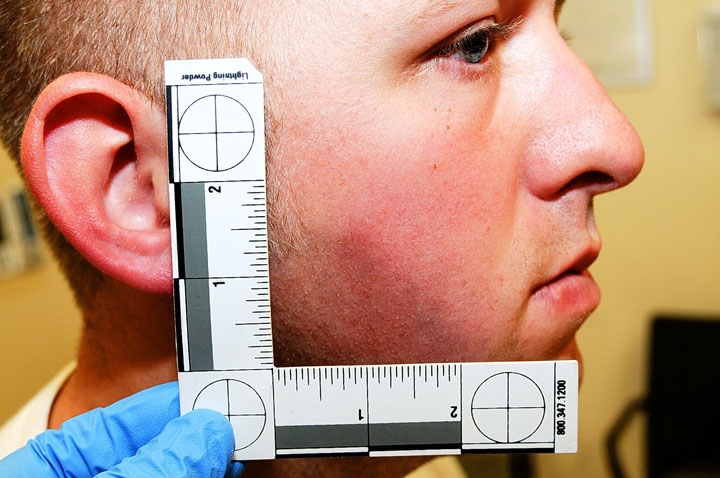WATCH: A grand jury sifted through a massive amount of evidence before deciding not to indict Darren Wilson in the killing of unarmed teenager Michael Brown. Eric Sorensen reports.

TORONTO – Angry residents set fire to Ferguson Monday night after learning what a grand jury had decided in the fatal shooting of black 18-year-old Michael Brown: That white police officer Darren Wilson would not be indicted, and therefore not criminally charged in the state of Missouri for the death.
So how did they come to that decision? Here’s a look at some of the factors at play.
Conflicting witness accounts
Witness accounts suggested Brown had his hands up in the air at the time he was shot multiple times by Wilson; this inspired the #HandsUpDontShoot hashtag on social media and slogan for the various protests that have occurred across the U.S. since his death Aug. 9.

But Prosecuting Attorney Bob McCulloch said there were inconsistencies and erroneous accounts from witnesses. When asked by a reporter whether any of the accounts amount to perjury, he said, “I think they truly believe that’s what they saw, but they didn’t.”
READ MORE: Eyewitness testimony ‘not nearly as reliable’ as we think, says psychologist
One witness testified that he saw Brown leaning through the police vehicle window and “some sort of confrontation was taking place.” He said a shot rang out and Brown fled as the officer chased him with his gun drawn. The witness said Brown stopped and turned but never raised his hands. He said Brown “ran towards the officer full charge.” The officer then fired several shots, but Brown kept rushing toward him, the witness said.
Another witness said after the first two shots were fired, she saw Brown running from Wilson’s vehicle but then he stopped, turned around and started heading toward Wilson, who shot at him. When asked if it appeared Brown was approaching Wilson in a threatening manner, the witness said, “No, he wasn’t … I think he was stunned, honestly. He just kept walking toward the officer, he didn’t stop.”
Extenuating circumstances in applying charges to a police officer
For Wilson to be charged with first- or second-degree murder, the grand jury would have had to believe he intentionally set out to kill Brown—unlikely in the situation of having run into him in the street.
READ MORE: Highlights of testimony in the Michael Brown shooting
Voluntary or involuntary manslaughter charges would have been more likely, if the jury thought Wilson had been negligent in his conduct.
However, police officers are protected by two Missouri laws: the defense of life standard and/or to prevent a violent suspect from escaping.
The defense of life standard relies on whether Wilson believed he (or an innocent party) was in danger—a belief that was suggested in his testimony released late Monday night.
Wilson told grand jurors he was thinking: “What do I do not to get beaten inside my car” after he said Brown slammed his door shut then hit him in the face.
“I drew my gun,” Wilson told the grand jury. “I said, ‘Get back or I’m going to shoot you.’
“He immediately grabs my gun and says, ‘You are too much of a pussy to shoot me,”‘ Wilson told grand jurors. He said Brown grabbed the gun with his right hand, twisted it and “digs it into my hip.”
Wilson told grand jurors he drew his gun because he was concerned another punch to his face could “knock me out or worse.”
Experts have noted grand jurors need only believe that Wilson perceived Brown to be a threat—and not that Brown actually was a threat.
The other law that protects officers has to do with preventing the escape of a violent suspect. Though initial reports were unclear on whether Wilson knew Brown was a strong-arm robbery suspect, McCulloch said Monday night that Wilson was aware of the tie, which the officer also mentioned in his testimony.
Wilson told jurors that when he initially encountered Brown and a friend walking in a street, Brown responded with an expletive after being asked to move to the sidewalk. Wilson then noticed that Brown had a handful of cigars, “and that’s when it clicked for me,” he said, referring to a radio report minutes earlier of a robbery at a nearby convenience store.
Prosecutor’s role in presenting options and history in Ferguson
Throughout the investigation, some black leaders and Brown’s parents questioned McCulloch’s ability to be impartial. The prosecutor’s father, mother, brother, uncle and cousin all worked for the St. Louis Police Department, and his father was killed while responding to a call involving a black suspect in 1964.

One former federal prosecutor also told Vox Media that instead of telling the grand jury what charges Wilson should face and presenting a few key witnesses, McCulloch put forth what he called “every scrap of evidence”—including the conflicting witness reports—and let them decide.
“So when a District Attorney says, in effect, ‘we’ll present the evidence and let the grand jury decide,'” that’s malarkey. If he takes that approach, then he’s already decided to abdicate his role in the process as an advocate for justice. At that point, there’s no longer a prosecutor in the room guiding the grand jurors, and — more importantly — no state official acting on behalf of the victim, Michael Brown…’” Alex Little told Vox in August.
The grand jury met for 25 days over three months and heard more than 70 hours of testimony from about 60 witnesses. Nine out of the 12 grand jurors had to agree on the decision.
READ MORE: Key figures in the fatal police shooting of Michael Brown in Ferguson
Though the outrage over the decision has been highlighted in social and mainstream media, there are also messages of support for Officer Wilson, as well as the decision of the grand jury.
The top comment from a Global News reader on one of Monday’s stories posted to Facebook offered another perspective:
“I personally would not indict officer Wilson if I were in the jury even if I think officer Wilson should have handled the situation better,” wrote Samuel Otuodi Ejiaga.
“I am black but the race thing is not always the case. Michael Brown lost credibility for stealing and attacking a store clerk which suggests he has the potentials (sic) to get violent. With evidence of a close encounter at Wilson’s car and injury to Wilson’s face, I can’t indict Wilson. Brown did not handle his part to the best of his abilities to ensure he remains alive. We all have our roles to play to ensure our safety in situations like this. Wilson has the right to respond if he felt threatened but would have done better.”
What about federal charges or lawsuits?
The Justice Department is conducting a separate investigation into possible civil rights violations that could result in federal charges, but investigators would need to satisfy a rigorous standard of proof in order to mount a prosecution. The department also has launched a broad probe into the Ferguson Police Department, looking for patterns of discrimination.
Brown’s family could also file a wrongful death lawsuit against Wilson.
With files from The Associated Press




Comments